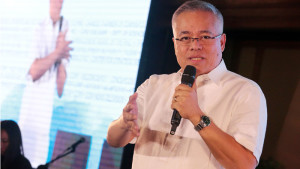It has been a long time coming but the unity driven by commitment between the government and the private sector to address the burning water issue has finally started.
Seven pre-summits on water leading to a national summit are being held in the next 16 days in Luzon, Visayas and Mindanao. There have certainly been enough studies on water but it is only now that these studies are being harnessed in a joint effort by the government and private sector to mount a massive movement for the water sector.
In a meeting in Malacañang on Jan. 20, Sen. Loren Legarda, Senate climate change and finance committee chair, said: “This initiative is unique. Usually, it is the government that asks for private sector participation. This time, it is the private sector asking the government to help them address our water crisis.”
Crisis it certainly has become as 73 people die every day from water-related causes. We collect only 4 percent of our rainwater, while India collects 60 percent. In an Asian Development Bank study, we ranked 38th in water security. We have low scores in all five water categories identified by the ADB in 2013 and 2016.
But it was the real-life pain experienced by the Agri-Fisheries Alliance that brought the water crisis to President Duterte’s attention on April 16, 2016. The leaders complained there was no water plan. Water was nowhere and everywhere. Nowhere, because when drought came, people suffered from no water. This was largely due to the denudation of 5.7 million hectares of forest lands. Everywhere, because of the uncontrolled floods that ravage our land. This is also because of the few 120,000 mangroves we have left from the 400,000 we had during the Spanish period. That is why the two programs started by former Environment Secretary Gina Lopez of growing bamboo in one million hectares and restoring the mangroves to its 300,000 level must be continued.
On May 17, during his first DENR flag-raising ceremony, Environment Secretary Roy Cimatu identified addressing water as a top priority. He said his main effort would be to protect the environment and implement laws, such as the Clean Water Act.”
On May 22, Senator Legarda chaired a water meeting with senior officials of the DENR, DA, DILG, DPWH, Neda and the Office of the Cabinet secretary, and private sector organizations. Together with Rep. Rodel Batocabe, they formed the steering committee of the water roadmap and summit. Legarda suggested that the committee ask Secretary Cimatu to lead efforts in addressing the water issue.
Within two hours the request for a water meeting was made, Cimatu had met with the group and agreed to lead efforts to address the water problem, putting his May 17 pledge into action.
Under his leadership, the private sector and the government have united in holding the seven pre-summits. These focused on the seven areas indicated by the ADB study: household, urban, agriculture, environment, economy, resilience and governance.
It is said UP Los Baños’ knowledge is used by other countries, but not by our own. This is because the link between UPLB and the government has not been fully utilized. This time, there is a memorandum of agreement between UPLB and the National Water Resources Board to provide the relevant research and technical expertise to support the water initiative.
With the leadership of the President, Secretary Cimatu, the Senate and the House of Representatives, and the participation and commitment, we can finally address the water issue. But this joint effort is just the start of a long journey to transform the sometime water curse into a permanent blessing.


